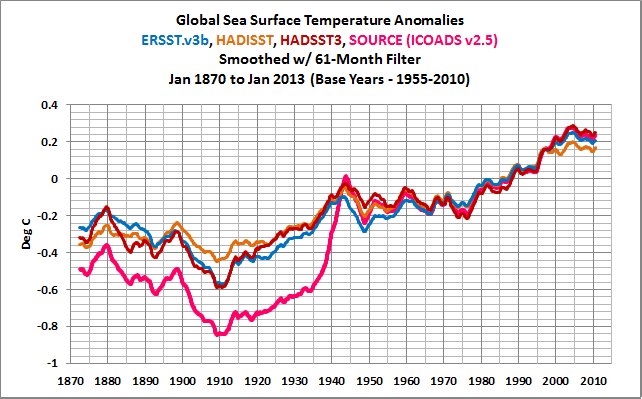Furthermore, the authors "report the presence of strong near-surface temperature gradients day and night, indicating that intake and bucket measurements cannot be assumed equivalent in this region. We thus suggest bucket and buoy measurements be considered distinct from intake measurements due to differences in sampling depth. As such, we argue for exclusion of intake temperatures from historical SST datasets and suggest this would likely reduce the need for poorly field-tested bucket adjustments. We also call for improvement in the general quality of intake temperatures from Voluntary Observing Ships... We suggest that reliable correction for such warm errors is not possible since they are largely of unknown origin and can be offset by real near-surface temperature gradients."
 |
| Data sets combining ship intake and bucket measurements show ~0.5C warming since 1870, but this new paper argues that the two types of measurement are from different sampling depths and should not be combined. Graph source: Bob Tisdale via WUWT |
For more on the ship intake vs. buckets issue and the questionable adjustments involved, see these posts at WUWT & links to Climate Audit:
Historical Sea Surface Temperature Adjustments/Corrections aka “The Bucket Model”…
Buckets, Inlets, SST’s and all that – part 1
Full papers available here:
Comparing historical and modern methods of sea surface temperature measurement – Part 1: Review of methods, field comparisons and dataset adjustments
School of Earth and Ocean Sciences, University of Victoria, Victoria, BC, Canada
Abstract. Sea surface temperature (SST) has been obtained from a variety of different platforms, instruments and depths over the past 150 yr. Modern-day platforms include ships, moored and drifting buoys and satellites. Shipboard methods include temperature measurement of seawater sampled by bucket and flowing through engine cooling water intakes. Here I review SST measurement methods, studies analysing shipboard methods by field or lab experiment and adjustments applied to historical SST datasets to account for variable methods. In general, bucket temperatures have been found to average a few tenths of a °C cooler than simultaneous engine intake temperatures. Field and lab experiments demonstrate that cooling of bucket samples prior to measurement provides a plausible explanation for negative average bucket-intake differences. These can also be credibly attributed to systematic errors in intake temperatures, which have been found to average overly-warm by >0.5 °C on some vessels. However, the precise origin of non-zero average bucket-intake differences reported in field studies is often unclear, given that additional temperatures to those from the buckets and intakes have rarely been obtained. Supplementary accurate in situ temperatures are required to reveal individual errors in bucket and intake temperatures, and the role of near-surface temperature gradients. There is a need for further field experiments of the type reported in Part 2 to address this and other limitations of previous studies.
Comparing historical and modern methods of sea surface temperature measurement – Part 2: Field comparison in the central tropical Pacific
1School of Earth and Ocean Sciences, University of Victoria, Victoria, BC, Canada
2Dr. J. B. Matthews Consulting, Tennis Road, Douglas, Isle of Man, British Isles
Abstract. Discrepancies between historical sea surface temperature (SST) datasets have been partly ascribed to use of different adjustments to account for variable measurement methods. Until recently, adjustments had only been applied to bucket temperatures from the late 19th and early 20th centuries, with the aim of correcting their supposed coolness relative to engine cooling water intake temperatures. In the UK Met Office Hadley Centre SST 3 dataset (HadSST3), adjustments have been applied over its full duration to observations from buckets, buoys and engine intakes. Here we investigate uncertainties in the accuracy of such adjustments by direct field comparison of historical and modern methods of shipboard SST measurement. We compare wood, canvas and rubber bucket temperatures to 3 m seawater intake temperature along a central tropical Pacific transect conducted in May and June 2008. We find no average difference between the temperatures obtained with the different bucket types in our short measurement period (∼1 min). Previous field, lab and model experiments have found sizeable temperature change of seawater samples in buckets of smaller volume under longer exposure times. We do, however, report the presence of strong near-surface temperature gradients day and night, indicating that intake and bucket measurements cannot be assumed equivalent in this region. We thus suggest bucket and buoy measurements be considered distinct from intake measurements due to differences in sampling depth. As such, we argue for exclusion of intake temperatures from historical SST datasets and suggest this would likely reduce the need for poorly field-tested bucket adjustments. We also call for improvement in the general quality of intake temperatures from Voluntary Observing Ships. Using a physical model we demonstrate that warming of intake seawater by hot engine room air is an unlikely cause of overly warm intake temperatures. We suggest that reliable correction for such warm errors is not possible since they are largely of unknown origin and can be offset by real near-surface temperature gradients.








0 comments:
Post a Comment